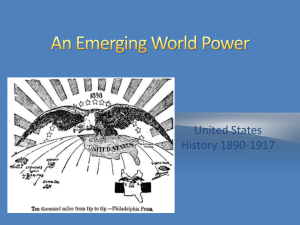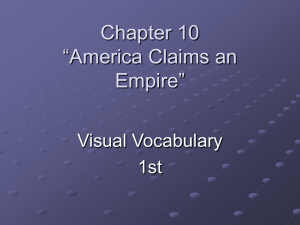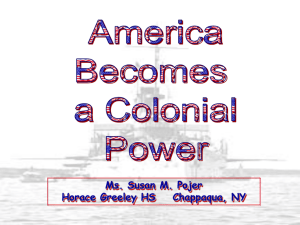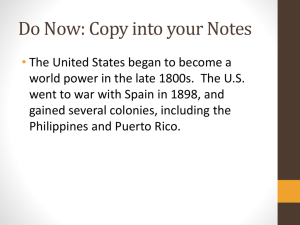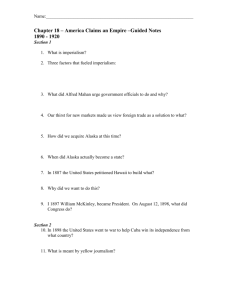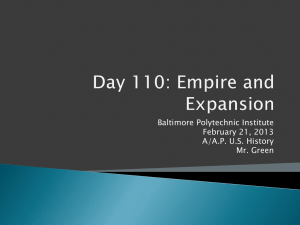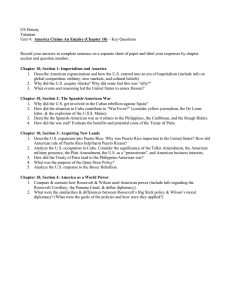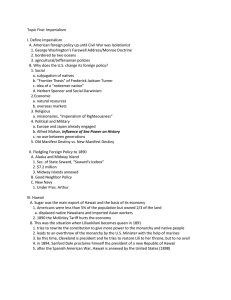Imperialism Power Point
advertisement
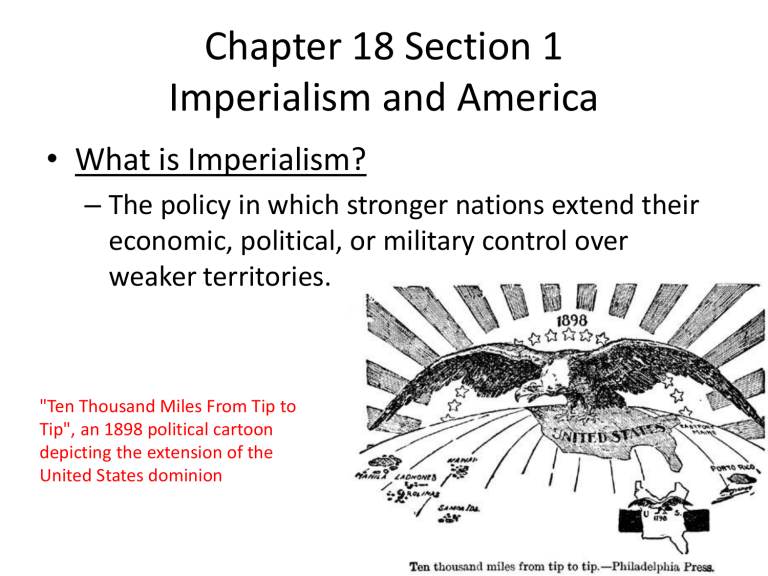
Chapter 18 Section 1 Imperialism and America • What is Imperialism? – The policy in which stronger nations extend their economic, political, or military control over weaker territories. "Ten Thousand Miles From Tip to Tip", an 1898 political cartoon depicting the extension of the United States dominion A. The Roots of American Imperialism: • 1. Economic Roots: – Industrial overproduction in the U.S. led to the view that the country’s factories needed raw materials from abroad. – Belief that surplus U.S. products needed to be sold in new markets • 2. Political and Military Roots – The global military expansion of European powers led the U.S. to desire to do the same – Alfred T. Mahan urged government officials to build up the American navy in order to compete. • 3. Racist Roots – Belief in the racial and cultural superiority of Anglo-Saxons led many to claim that the U.S. had a responsibility to expand and spread Christianity and civilization B. U.S. Imperialism in Hawaii • • • • • • 1875: U.S. agreed to import Hawaiian sugar duty-free 1887: U.S. forced Hawaii to allow an American naval base at Pearl Harbor 1890: McKinley Tariff eliminated duty free sugar 1891: Queen Liliuokalani comes to power, asserts “Hawaii for Hawaiians” 1897: William McKinley becomes president 1898: Congress declares Hawaii an American territory Debate in Congress: "we must have Hawaii to help us get our share of China." Chapter 18 Section 2 The Spanish American War Causes of the War: • • • • • • American Business Owners Jose Marti Valeriano Weyler Yellow Journalism De Lome Letter USS Maine American Business Owners • protect their investments Jose Marti • Organized Cuban resistance against Spain • Provoked U.S. intervention, cried Cuba Libre! • Feared U.S. intervention because of threat of imperialism Valeriano Weyler • Sent to restore order in Cuba in response to Cuban revolt in 1896 • Set up concentration camps to try and crush rebellion. Yellow Journalism • William Randolph Hearst and Joseph Pulitzer • Exaggerated accounts of stories • Sensationalist style of writing, exaggerating news to lure and enrage readers. • Pushed for war De Lome Letter • McKinley tried to resolve the crisis between Spain and Cuba diplomatically. • Private letter by De Lome to the Spanish minister of the U.S. which criticized McKinley and called him weak. Leaked to the press. • Spanish government apologized, but angered Americans. U.S.S. Maine • Ship blew up in Havana’s harbor on February 15, 1898. • Newspapers claimed Spain blew up the ship April 20, 1898 • Congress declares war June 1898 • Americans land in Cuba. (Including the famous Rough Riders) July 1, 1898 • Rough Riders successfully converge on Santiago. Victory at the Battle of San Juan Hill. July 25, 1898 • American troops invade Puerto Rico February 6, 1899 • Treaty of Paris Effects: What happened to the following territories as a result of the war? • • • • Cuba Puerto Rico Guam Philippines Cuba • Achieved Independence from Spain Puerto Rico • Went from Spanish to American rule. Guam • Went from Spanish to American rule. Philippines • Sold by Spain to the U.S., annexed by the U.S. Chapter 18 Section 3 Acquiring New Lands Puerto Rico Cuba 1898-1916 1898-1903 What was its Very similar to that of a Protectorate: the relationship to the ? colony relationship a superior authority assumes by one power or state over a dependent one. Why did the try to Its location was one of To protect control its affairs? strategic importance to American businessthe US especially in sugar, tobacco, mining, RRs, and public utilities. What laws and policies -Treaty of Paris -Platt Amendmentaffected its -Foraker Act: ended insisted that add relationships military rule and set up certain provisions a civil government. to their -Supreme Court Insular Constitution. cases rules that -Imperialist Constitution did not policies automatically apply to people in acquired territories. -Imperialist policies What violent events The Spanish-American Spanish-American affected its relationship War War with the ? The Philippines 1898-1945 Very similar to that of a protectorate or colony China 1900 Trading Partner To provide the with raw materials and new markets To establish and protect new markets in Asia -Treaty of Paris called for American annexation of the . Removal policy Imperialist policies Open Door Policy Imperialist policies Spanish-American war, Philippine-American War Boxer Rebellion John Hay’s “Open Door Policy” paved the way for greater U.S. influence in Asia. Note three beliefs held by Americans that were reflected by the Open Door Policy. • 1. The U.S. economy relied on exports to ensure growth • 2. The U.S. had the right to intervene abroad to keep foreign markets open to it • 3. U.S. survival was threatened by the closing of an area to American products, citizens or ideas. Chapter 18 Section 4 America as a World Power 1. Roosevelt’s “Big Stick Diplomacy” • Treaty of Portsmouth is negotiated – The Russo-Japanese War ended – The Nobel Peace Prize is awarded to Roosevelt – American prestige increased U.S. warships are used to ensure Panama’s Independence • Rights to build a canal, to control the Canal Zone, and to intervene in Panama gained by the U.S. • the Panama Canal is built • U.S./Latin American relations severely damaged Panama Canal is built Roosevelt Corollary is adopted • U.S. adoption of dollar diplomacy • U.S. military interventions in Latin American, specifically Nicaragua Wilson’s Missionary Diplomacy Wilson uses a minor incident with Mexico as an excuse to occupy Veracruz • Death of at least 200 Mexicans • U.S. and Mexico brought close to war Wilson recognizes the Carranza Government • - U.S. comes into conflict with Pancho Villa Wilson refuses Carranza’s demand to withdraw U.S. troops sent into Mexico to capture Villa • - Anti American feeling in Mexico • -Mexico nationalizes oil and mineral resources
